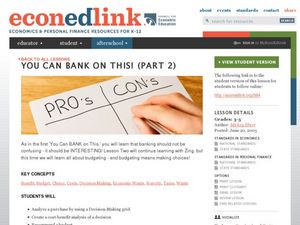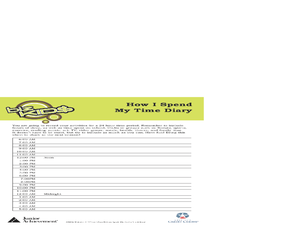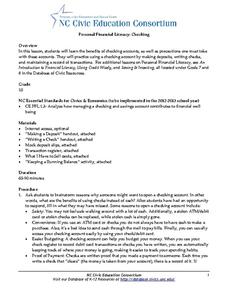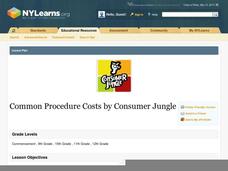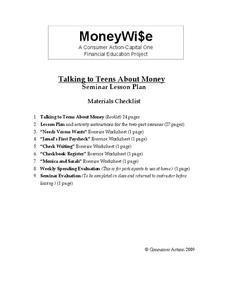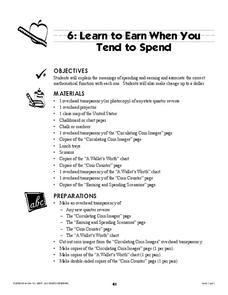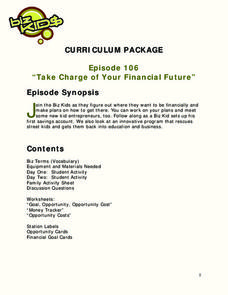Council for Economic Education
You Can BANK on This! (Part 2)
This is part two in a four-part instructional activity on banking and personal finance. In this instructional activity, learners analyze whether or not they have made a good purchase, then discuss how to make an informed decision about a...
Practical Money Skills
Saving and Investing
Learn the difference between saving money and investing money, as well as the advantages and disadvantages of each. Kids review banking and personal finance terms before studying the different ways that people can reach their financial...
Curated OER
How to Achieve Your Financial Goals
Students explore economics by creating a budget. In this financial goal setting instructional activity, students investigate their use of time by completing a worksheet. Students identify financial goals they would like to achieve in the...
Center for Literacy and Disability Studies
Personal Financial Literacy: Checking
After researching local banks and the checking account benefits offered by each, class members practice filling out a deposit slip, writing a check, and keeping a transaction register.
Practical Money Skills
Making Money
The first step in managing your money is making money! Learn about ways to find and interview for a job with a thorough lesson plan on personal finances. Kids learn about the ways to earn a paycheck and then manage the funds they receive.
Curated OER
Debt: Who Does it Affect?
Debt is a topic that affects everybody: the community, the nation, and the entire globe. Kids take charge of debt by designing a project that informs those in their community about good financial choices, keeps personal debt low, and...
Curated OER
Common Procedure Costs
Kids never think about the cost of medical expenses, because they never think they'll get hurt. To better understand personal financial planning, learners research common medical procedures and their costs. They use a worksheet and the...
Curated OER
Money: Bucks, Banks, and Business
Put economics and currency exchange rates into a real-world application kids can understand. They'll compare bus fares from various cities around the world. Each child selects three international cities to research. They determine the...
Practical Money Skills
Budgeting Your Money
How do you make sure that your income doesn't disappear before you have a chance to save it? Use a creative budgeting activity to teach learners in both special education and mainstream classes how to keep track of their expenditures and...
Practical Money Skills
Shopping Wisely
Work on making good shopping choices with a fun economics project. Kids analyze the differences between brand names and generic products, bigger and smaller units for purchase, and different places they can shop for different items.
Curated OER
Spend, Save, Invest or Donate (9-12)
Students explore the concept of personal finance. In this philanthropy lesson, students examine decisions they make about money as they discover the definitions of philanthropy, resources, scarcity, choice, benefits, costs, opportunity...
Consumer Action
Talking to Teens About Money
Your teenagers are probably very good at spending money, but how good are they at managing it? Teach class members about banking, checking accounts, interest rates, car insurance, and many other relevant concepts with a series of...
Practical Money Skills
Understanding Credit
Help your young consumers learn about credit and the importance of credit history. With a thorough lesson about the ins and outs of credit, as well as the potential pitfalls of having a line of credit, kids will be well-equipped to...
Curated OER
Scoring a Financial Education
Students explore the concept of money management. In this money management lesson, students read an article about students taking a finance course in high school and college. Students discuss the importance of money management. Students...
Curated OER
Learn to Earn When you Tend to Spend
Analyzing and understanding word problems is extremely important. Pupils learn that in money problems, earn usually means you add and spend usually means you subtract. They will solve a series of money-related word problems, label coins,...
Curated OER
Budgeting Your Financial Resources
Young scholars explore the aspects of making a budget. In this money management lesson, students learn the importance of budgeting and what all goes into creating a budget by eventually creating a budget of their own including how much...
PwC Financial Literacy
Credit Reports
Middle schoolers discover why it's important to establish a positive credit history and understand the value of credit reports to lenders and borrowers. They apply legal guidelines to establish the uses of a credit report other than...
Curated OER
Take Charge of Your Financial Future
Students discuss Biz Kids understanding that it is a program to help people become financially educated. In this mathematics activity, students view an episode and discuss what they would do if given various situations like going out or...
Julie Negrin
How to Teach Cooking to Kids
Youngsters are more likely to eat something if they've worked hard to make it! Plan a cooking class with an e-booklet from Julie Negrin, author of Easy Meals to Cook With Kids. It includes what you should consider about your...
Curated OER
Family Faces a Real Struggle In Saving Money For College
Explore the concept of savings with your high schoolers. They read an article about saving money for retirement and as a way to pay for college. They discuss the financial needs of the family in the article in regards to saving for...
Visa
Making Spending Decisions
By role playing real-world experiences, such as purchasing snacks and grocery/toy store shopping, your youngsters will begin to develop an understanding of how to make decisions and choose between alternatives. This is the first...
Practical Money Skills
Using Banking Services
Using a bank is a privilege and a responsibility for young consumers. Teach them the important terms and details about creating accounts, using an ATM, and maintaining a credit card.
Curated OER
Jesse's Big Change
High schoolers explain assets, liabilities and expenses. They record information on income statements and balance sheets and brainstorm opportunities to make money work for them.
Curated OER
Print & Go ESL
Improve reading comprehension with a set of ESL worksheets. Kids read through various passages, note which facts are true or false, mark their opinion on two statements, and write a short reply based on a writing prompt.
